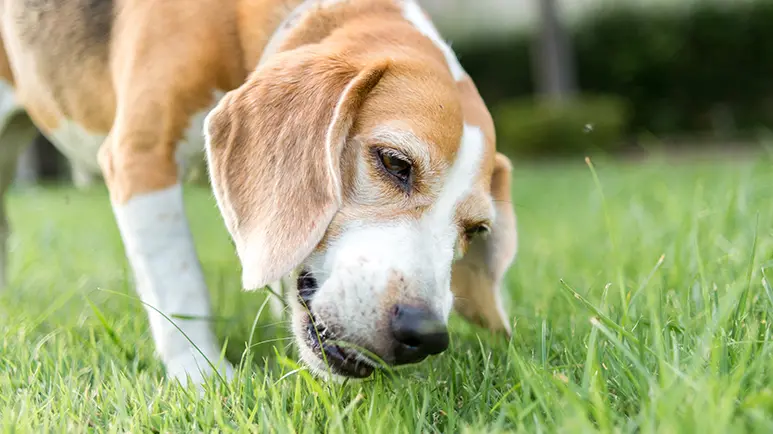Why Does My Dog Eat Grass? Canine Mystery Revealed
Most dogs eat grass occasionally. But what's with that bizarre action anyway? While it may be just for kicks, these four health-related issues can absolutely trigger the habit. So take time today to pull back the curtain and get the lowdown on the why's and wherefores.

STORY AT-A-GLANCE
- Most dogs eat grass at least occasionally, and there are a number of reasons for the behavior
- A grass-eating dog may be trying to relieve digestive upset, or she may be seeking certain nutrients her diet isn’t providing
- If your dog is regularly eating significant quantities of grass, make an appointment with your veterinarian, and in the meantime, consider upgrading his diet
Editor's Note: This article is a reprint. It was originally published August 12, 2019.
Most dogs eat grass occasionally, and some graze on the green stuff much more often than occasionally. It’s one of those slightly peculiar canine behaviors that seems harmless enough, but many pet parents are curious as to why their well-fed furry family member feels the need to do it.
Dogs Probably Eat Grass for a Number of Reasons
The truth is that grass eating, a behavior some classify as "pica" — the ingestion of nonfood items — is quite common among dogs, both wild and domestic. Grass eating can be a sign of boredom or a way to pass the time for some dogs; for others, it’s a fun and rewarding behavior. However, there are also certain health-related reasons dogs eat grass:
- To balance the microbiome — Grass contains prebiotic fiber that may help keep your dog’s intestinal flora balanced and resilient.
- To relieve gastrointestinal (GI) upset — Many dogs with an upset tummy will, given the chance, consume large quantities of grass because they instinctively know it will make them throw up. There seems to be something about the texture of grass that triggers vomiting or a bowel movement in many dogs, which relieves their discomfort.
If this is the situation with your dog, she’ll probably seem almost frantic to get outside to start gobbling up the nearest patch of grass. If the “cure” works, at some point she’ll quit chewing, lick her lips (a sign of nausea in dogs) and throw up.
This is pretty normal behavior for canines (who are, after all, scavenging carnivores and indiscriminate eaters) and nothing to be concerned about unless it happens more than once or twice a year. It’s nature’s way of helping dogs get rid of toxins from their bodies and bring their GI tracts back into balance. - To eliminate intestinal parasites — Chimpanzees consume plant material to increase intestinal motility to rid their bodies of intestinal parasites.1 It’s possible dogs eat grass for a similar reason.
- Grass eating may be an inherited trait designed to fulfill specific nutrient requirements — In a 2008 study, researchers found that grass eating in domestic dogs is a normal tendency.2 This might be an inherited behavior, since wild canines eat entire prey animals, including the entrails (guts), which typically contain digested plant matter.
It’s possible the grasses your dog likes to munch contain nutrients her body lacks. Grass is an abundant source of fiber. As a living green food, it contains phytonutrients, is high in potassium and chlorophyll and is also a pretty good source of digestive enzymes. So, your dog could be seeking out selective grasses to make up one or more nutrients she’s not currently not getting in her diet.
What to Do if Your Dog Regularly Eats Grass
If your dog’s grass eating is chronic and especially if it causes him to vomit frequently, it's time to make an appointment with your veterinarian.
In the meantime, I recommend upgrading his diet if he's still eating kibble or any non-human-grade commercial dog food. Most healthy dogs fed a nutritionally optimal, species-appropriate diet don't eat grass because they receive all the nourishment their bodies need from their food, and they rarely suffer from digestive issues. Adding probiotics and digestive enzymes can also benefit dogs with "sensitive stomachs."
If you're sure your dog is receiving optimal nutrition from his diet, but he still eats a significant amount of grass, consider growing your own sunflower sprouts. Sprouts can provide an easy, inexpensive source of fresh, live, organic vegetation and are much more nutritious than grass.
If rather than frantically mowing your lawn, your dog specifically and carefully chooses tall, broad grasses to nibble (the kind that typically grow along a fence line or between cracks in the sidewalk) and then moves on, she’s eating grass because she wants to or because she’s seeking specific nutrients. There’s no cause for concern as long as you’re sure the grass she’s sampling is free of pesticides, herbicides and other contaminants.
Sources and References
- Bark Post
- 1 International Journal of Primatology, June 2001; 22(3): 329–346
- 2 Applied Animal Behaviour Science, Vol. 111, Iss. 1-2, May 1, 2008











